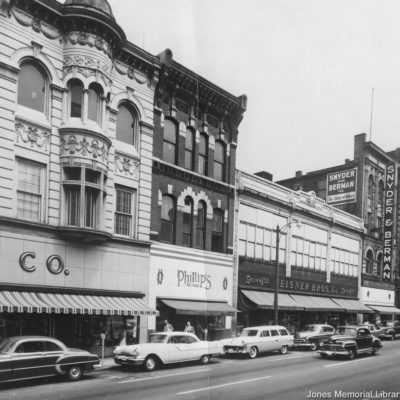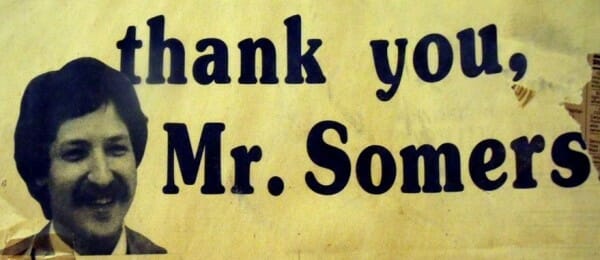We are America’s oldest pawn shop, established in 1890 in Lynchburg, VA.
The history of L. Oppleman Pawn Shop starts in 1890. It was founded in Lynchburg, VA by Jacob and Lena Oppleman. The “L” in our name, actually, stands for Lena! Eventually, their son, Ike Oppleman, took over operations during the 1920’s.

In the 1930’s, a young man named Aaron Somers began working at the pawnshop. He quickly and unquestionably fell in love with the business. Following Ike’s passing, Aaron acquired L. Oppleman and continued the legacy. L. Oppleman had become a staple business to Lynchburg, which prompted Aaron to continue operations under the prestigious name.
In the early 1970s, Aaron Somers had begun to consider selling the business. His son, David Somers, was studying at the University of Colorado and had plans for a law degree at the University of Richmond. However, he found himself with some free time in 1974. Despite being unable to work together in the past, Aaron made a proposition to David stating “I’ll take the jewelry and pawn broker end, you take the music. You stay out of my way, I’ll stay out of yours”. It did not take long before the pair began to thrive as a team and David was hooked. Following Aaron’s death in the mid 1980s, David fully took over operations.
In accordance with family tradition, David’s son, Ryan Somers, now runs the day to day operations. His career with the company officially started in January of 2002. However, being a pawnbroker in his father’s company has been a life long dream; dating as far back as age 6! In 2008, he became a GIA-Certified Gemologist. Additionally, in 2016, Ryan facilitated the acquisition of King Pawn on Campbell Ave in Lynchburg, VA. Since then, our second location has grown to become as undeniably integral to our community as its parent store.
FOR 133 YEARS AND COUNTING,
L. Oppleman is America’s Oldest Pawn Shop. According to Darrell Laurant of The News & Advance, Harold Dambrot of the Four Aces Pawnshop in New York searched for the nation’s oldest pawn shop before the 2001 national convention of National Pawnbrokers Association and concluded that L. Oppleman was certainly the clear choice.

David Somers, who has been running L. Oppleman for more than two decades, prefers to say it’s the oldest pawn shop operating under the same name. This is because pawn shops change hands a lot, and often the name changes with ownership. Presently, L. Oppleman has had a total of ONLY four bosses in the history of 133 years. That’s as many as General Motors has had since 2000!
To learn more about what we do, please feel free to contact us by clicking the link HERE.
Who are our customers?
There are a lot of misconceptions around the idea of pawnbroking. We are actively working on breaking through that barrier. Our customers range so greatly on the scale.
In terms of retail, we have high-end clientele and blue collar! Both of them are looking for value. Many of our customers have been raised in the “pawn environment”. Their families have pawned and shopped with us for generations. Others are simply looking for the best possible deal on high end items.
Retail is not the only area where our customer base varies. Subsequently, our pawn customers utilize our services for many diverse reasons. For example, estates of a deceased loved one, light bills, exchanging unneeded items for others, diapers, gas money, spring cleaning, and more.
To sum up, every class system in America utilizes pawn shops in some way!
How does the economy affect pawnbrokers?
Pawnbroking does equally as well in good economic times as it does in bad economic times.
It’s kind of recession-proof. A good economy promotes retail sales while a bad economy pushes loan activity. In 2012, Marketdata’s Research Director, John LaRosa, stated that “…The ranks of the “unbanked” consumer continue to grow. Pawn shops provide a service that traditional banks cannot – short term loans for small amounts of money.”
Does the Internet hurt pawnbrokers? Why would customers come to a pawnshop if they can sell on platforms, such as eBay?
Firstly, our customers come to us because they need their money now. To go online, they risk the chance of waiting anywhere from days to months before making a sale. Plus, for people who do not wish to let go of their item, we offer loans where they can redeem their property.
Secondly, online sales platforms, actually, aid both the pawn AND retail sides of our business. We are able to take the vast majority of items that come in the store because we have the ability to reach a larger customer base. We no longer have to rely solely on the interests of the community around us to make a sale.
How does L. Oppleman differ from other pawnshops in Lynchburg?
One of the things we do is our “Oppleman Dollars”. When a customer redeems an item they have pawned with us, we give them a portion of their interest back in a gift card to spend with us!
We also offer tax services. Yet another member of the Somers family, Jeff Somers (cousin of owner David Somers), joined L. Oppleman to extend tax services to our customers. In exchange for using our services, we give customers a $50 gift card to spend with us! For further information and pricing on taxes, please feel free to contact us.
As America’s Oldest Pawn Shop, we have had the opportunity to build long lasting relationships with our customers. Generations of Opplemans and Somers have served generations of Lynchburg residents. We strive to bring a family atmosphere founded on loyalty and respect to every individual who walks through our doors.